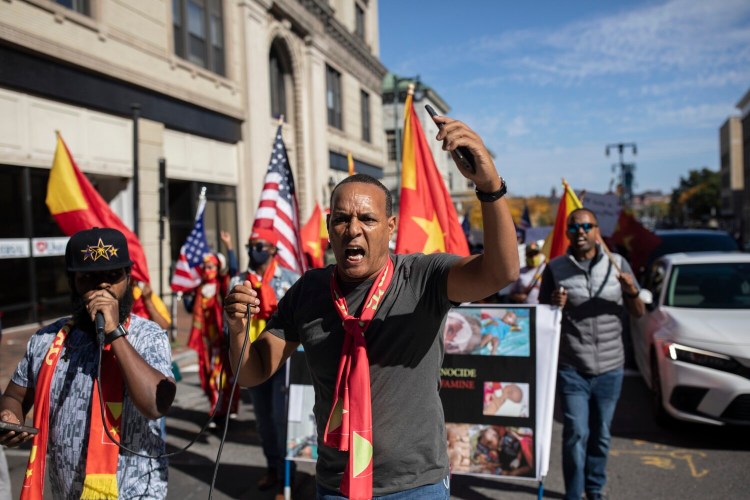Dozens of people whose families’ lives are at risk in the Tigray region of Ethiopia marched through downtown Portland on Wednesday morning to bring attention to a war that has created a humanitarian crisis of epic proportions.
About 100 people from Maine and New England participated in the “End the Tigray Genocide and Manmade Famine” protest, which started at Portland City Hall and ended with a march up Congress Street.
Protesters said the march was intended to raise public awareness about the conflict in Ethiopia’s Tigray region, where millions of people have become isolated by a war between the Ethiopian government led by Prime Minister Abiy Ahmed and the Tigray People’s Liberation Front that erupted in November 2020.
The demonstrators in Portland said people in the Tigray region are starving, need water and have no access to medical supplies. Communications networks have been shut down, banks closed and aide workers from the United Nations were recently expelled from the African nation. Ahmed has aligned his forces with Eritrea, a nation on Ethiopia’s northern border.

About 100 people marched up Congress Street in downtown Portland on Wednesday to protest genocide and famine in the Tigray region of Ethiopia. They called for action by the U.S. government and international organizations to help stop the violence in Tigray. Brianna Soukup/Staff Photographer
Protesters characterized Ahmed as a dictator who is carrying out a genocide. They want the United Nations and the United States to intervene. Last month, Ethiopia kicked out seven United Nations officials it accused of “meddling” in the country’s internal affairs, The Associated Press reported. The expulsions are the government’s most dramatic move yet in the conflict to restrict humanitarian access to the region of 6 million people. Despite U.N. efforts, the flow of medical supplies, food and fuel into Tigray has been brought to a near-halt, the AP reported. Ethiopia’s government has accused humanitarian workers of supporting the Tigray forces who have been fighting its soldiers and allied forces.
Hagos Tsadik, who lives in Cape Elizabeth, helped organize Wednesday’s protest. He said he has not seen or spoken to his eight brothers and three sisters since the war started 11 months ago. Tsadik emigrated to the United States from Ethiopia in 1994.
He has submitted letters to members of Maine’s congressional delegation asking for help. At the very least, humanitarian workers should be granted unlimited access to Tigray, he said.
“In the last 11 months, since the start of the war, the Ethiopian and allied forces have committed grave atrocities against the people of Tigray,” Tsadik wrote. “They have massacred tens of thousands of civilians, forcibly displaced more than 2.5 million civilians, and have been on a campaign of weaponized sexual and gender-based violence. Of utmost concern is the government’s use of weaponized starvation, leaving around 1 million people of Tigray facing famine.”
“A lot of people, who came today cried, but we don’t need crying, we need action,” he said.

Nyawal Lia, left, of Falmouth, and Nyamuon Nguany of Portland participate in Wednesday’s protest against genocide and famine in Tigray. Lia and Nguany are both South Sudanese and decided to support the cause. “We’re from a neighboring country who went through something similar and we know how important it is to show up,” Nguany said. Brianna Soukup/Staff Photographer
Alem Sinke drove from Boston to Portland on Wednesday to participate in the march. Sinke emigrated to the United States in 1990, leaving a sister, their elderly mother as well as aunts and uncles behind in Tigray.
“I came because I wanted to be a voice for our people,” Sinke said.
Though the government has been able to shut down most lines of communication, Sinke said she was able to reach her sister by cellphone last week. It was their first conversation in months. Her sister told Sinke that she and their 80-year-old mother were doing as well as could be expected under the circumstances. She has not heard from her aunt or uncle in 11 months.
“We want everyone to know that children are dying over there,” Sinke said. “We need action now.”

Lemlem Abre, center, marches up Congress Street in downtown Portland on Wednesday. She moved to the United States 22 years ago but still has family members living in the Tigray region of Ethiopia. Brianna Soukup/Staff Photographer
Misak Adane, who lives in Portland, emigrated to the United States from Ethiopia in 1990. She has had no contact with her grandparents, aunts and uncles, and cousins for 11 months. She worries about their well-being. Ahmed’s troops have looted pharmacies, stolen crops and are starving people to death, she said.
“It’s inhumane what is happening there. It’s beyond our comprehension,” Adane said.
She said Wednesday’s march and protest is important because many Mainers and Americans don’t seem to be aware of the crisis.
“If we sit and do nothing, people will die in the dark. There will be no light,” Adane said. “We have to speak out for those who can’t speak.”
Copy the Story LinkComments are not available on this story.
Send questions/comments to the editors.



